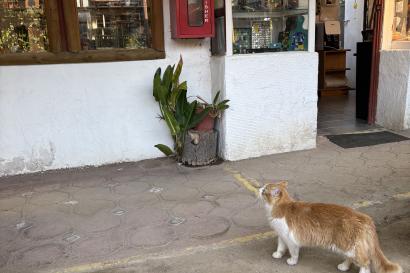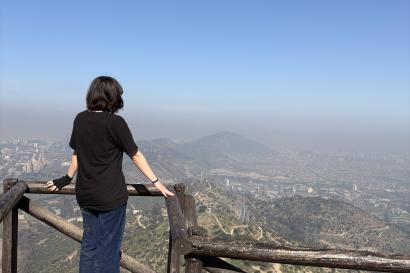I think I got the perfect internship.
As part of the Santiago Summer Internship program, I was placed as an analyst of Latin American affairs for a prominent progressive Chilean think tank called Fundación Chile 21. My work days usually start with a pretty easy 45-minute commute to the Tudor-style office with a view of the Andean cordillera. I say hello and chat in Spanish with my coworkers who always brighten my day with their inclusivity and friendliness before entering the intern office and settling down at my own desk and getting out my laptop. I eat breakfast while I work on two reports, both written in Spanish. The first report is a twice-weekly summary of recent political or economic events in Latin America, on which I collaborate with another intern from an American graduate program. The second report is my individual report, where I write a three to five-page analysis of a bigger event or trend in Latin America, which I turn in every two weeks. The reports are reviewed by my boss and circulated to the Chile 21 readership, which includes think tank directors and prominent influencers. Everyone in the office eats lunch together in the sunny conference room at 2 pm, and then I do a few more hours of work before I head out to class at the IES Abroad center. As a freshman International Studies and Sociology major, doing real work for such a prominent think tank while living abroad has given me valuable experience in terms of understanding the role of think tanks in society and politics, honing my analytical and linguistic skills, and seeing my home country and the world from a new perspective. I feel incredibly lucky.
But I didn’t always feel so lucky; in fact, before flying 5,000 miles to Santiago, I almost dropped out of the program entirely because I didn’t have an internship in my field.
The process of getting an internship through the Internship Program starts with you, the student, signing the dotted line and committing to be part of the program, before knowing your internship placement. To me, it already felt like a plunge, like a leap of faith, to be entrusting my summer and my budget to a team of professionals in a foreign country tasked with matching me with a good internship. But working in a foreign country was exactly what I wanted: I had taken classes all year and was ready for work experience, but I was also ready to leave my home state and challenge myself in a new language. It seemed like a gamble, but I committed to the unknown.
On a Skype interview with an IES Internships staff member, I discussed my interests: political science, international relations, and economic development. I didn’t have a clear idea of the internship I wanted, but I left the interview feeling hopeful.
A few weeks later, and only a few weeks before my flight to Santiago, I received my internship placement by email: a position as a teacher at a rural school. I was disappointed, and talking to my parents didn’t help. They urged me to get an internship more aligned with my professional interests or drop the program entirely, and I started to panic.
After a frantic email or two, I was on a new Skype call with the IES Abroad Santiago Center Director, Maricarmen. I was ready to hold my ground and insist on an internship in my field, but I soon realized I didn’t have to do that: Maricarmen, and all of IES Internships, was on my side. They wanted to fix my situation and make sure I was happy. She explained that because of recent elections and other complications, it had been difficult this year to find placements, but she said she would reach out to her contacts and that she was sure I would get another internship offer, this time in politics. I was relieved and excited again. I just had to trust the process.
But as my departure date approached, it was harder and harder to trust the process. Each new opportunity, in government agencies, in university research, and in political parties, seemed to fall through for reasons outside of our control. By the time I boarded the plane to Santiago, I still did not have an offer from an internship in my field. I was trusting the process, and sometimes it was really hard, but now, three weeks into my internship, I’m so happy I did.
So here are my tips for navigating, and trusting, the process:
First, if you know what you want, be specific about your interests during your initial statement and Skype interview discussion. You may enjoy some subjects as personal interests, but if you know you want an internship or a career in a different field, then be specific about which field that is. If you study political science or international studies, like me, emphasize politics and organizations you would love to work in: think tanks, government agencies, civil rights movements, university departments, political parties, the list goes on. If you’re not sure which jobs are available in your field, it might help to research that beforehand. IES Internships has, or will make, the connections for you.
Second, if you’re not thrilled with your first internship placement, try giving it a chance by researching the organization and asking about your potential role. Have an open mind, but…
Third, if you’ve thought it over and your first internship placement does not fit your interests, then make that clear as soon as possible so that you and IES Internships can find a better placement for you. This can seem scary, and you may not want to come off as rude, but it is in everyone’s best interests if you are clear about what you’re feeling early on. In my case, I wrote an email stating politely but directly why I was turning down the first internship placement and reiterating what my career interests were. Talking over Skype can really help.
Finally, trust The Process. And no, I’m not talking about the process of finding a placement. My internship search was messy, probably messier than most: I was disappointed and stressed and wondered if my leap of faith had all been a mistake. But doing business is a part of life, and oftentimes it is messy. Interacting and connecting with organizations in the professional world is a process in itself, and The Process doesn’t start or end with IES Internships. By trusting The Process, I learned to be comfortable and optimistic about the unknown while standing up and working with people to achieve a better outcome.
And it really worked: I got the perfect internship for me.

Megan Rutkai
Hey there, my name is Megan! I'm from a rural suburb south of Annapolis, Maryland, and like many Annapolitans, I love sailing, summer, and being on the water. When I'm not in my quiet hometown, I'm enjoying (and adjusting to) city life in Baltimore, studying International Studies and Sociology in my first year at Johns Hopkins. This summer, I'll be living and working in a city a bit farther from home: Santiago, Chile!








